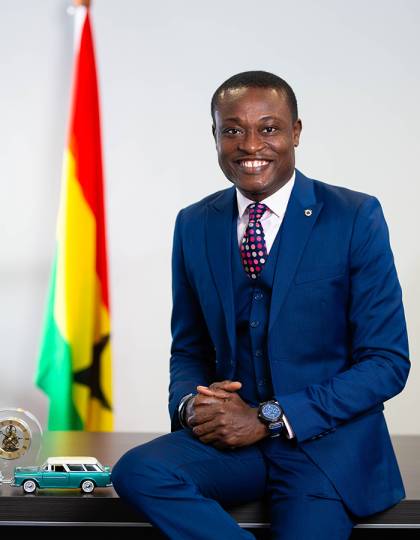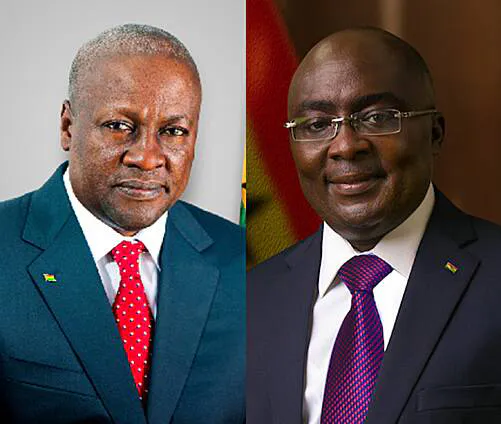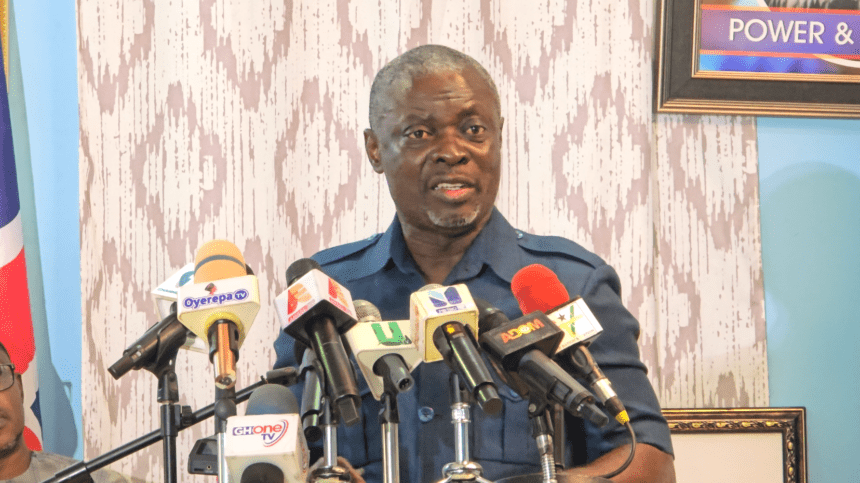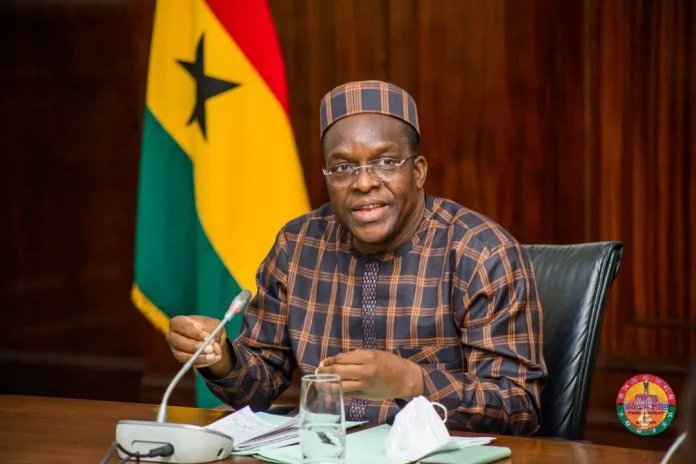Politics
“State capture, corruption ingrained in society like rituals” – Kissi Agyebeng
Published
2 years agoon
By
Melody 911FM
Special Prosecutor, Kissi Agyebeng says state capture, corruption and fraud are ingrained in the Ghanaian society much like rituals.
Describing the aforementioned practices as “tri-malady,” the Special Prosecutor said they manifest themselves in various forms thus inhibiting the progress of the state and dissipating its resources.
The Special Prosecutor said this during ICC FraudNet’s 37th International Conference and Meeting held in Accra on Friday, April 28, where he was the guest speaker.
The conference was under the theme; ‘State Capture and Corruption’.
“The issues of state capture, corruption, and fraud are a collective pandemic in our part of the world. This tri-malady has every intention of staying with us unless we act. In their various manifestations, they inhibit our progress and dissipate our resources. We experience their debilitating effects all around us in their full force and they are ingrained in our society much like rituals,” Kissi Agyebeng noted.
He observed that state institutions are being neutralized as appendages of individuals and existing laws adding that the legal system is being weakened for private gains.
The Special Prosecutor indicated that it will be difficult for anyone to put an actual price tag on the economic cost of state capture, corruption and fraud.
“The abuse of entrusted power for private gain is the currency. Misrepresentation of events and facts for pecuniary gain has never been this attractive. Then again, there appears to be a sprint for the inordinate control of state institutions and the public decision-making process. State institutions are being neutralized as appendages of individuals and existing laws and the legal system are being weakened for private gain.
“To further sink ourselves in our ill-progress, we are flighting away and secreting our illicitly gorged up bounties in other jurisdictions to avoid detection and to evade recovery. And it seems to me that no one can put an actual price tag on the attendant social and economic cost of state capture, corruption, and fraud,” he emphasised.
Enumerating the various sectors where corruption mostly occurs, he mentioned illegal mining where the country is bedevilled with the wanton destruction of protected forests.
“These are endemic in several sectors of the economy. The usual suspect is the extractive industry. Offshore, we are confronted with the scourge of oil bunkering. On land, we are bedevilled with wanton destruction of protected forests and real property and the mind-numbing pollution of our water bodies – mostly springing from illegal mining. Illegal capital flight and breaches of public procurement rules are rampant,” he said.
Read below the full speech by Special Prosecutor:
Friday, 28 April 2023
Remarks by Special Prosecutor at ICC conference
Featured
The issues of state capture, corruption, and fraud are a collective pandemic in our part of the world. This tri-malady has every intention of staying with us unless we act. In their various manifestations, they inhibit our progress and dissipate our resources. We experience their debilitating effects all around us in their full force and they are ingrained in our society much like rituals. In Ghana, meritorious or otherwise rightfully deserving standards for the allocation of opportunities and resources are eluding us. The abuse of entrusted power for private gain is the currency. Misrepresentation of events and facts for pecuniary gain has never been this attractive. Then again, there appears to be a sprint for the inordinate control of state institutions and the public decision-making process. State institutions are being neutralized as appendages of individuals and existing laws and the legal system are being weakened for private gain.
To further sink ourselves in our ill-progress, we are flighting away and secreting our illicitly gorged up bounties in other jurisdictions to avoid detection and to evade recovery. And it seems to me that no one can put an actual price tag on the attendant social and economic cost of state capture, corruption, and fraud.
These are endemic in several sectors in the economy. The usual suspect is the extractive industry. Offshore, we are confronted with the scourge of oil bunkering. On land, we are bedeviled with wanton destruction of protected forests and real property and the mind-numbing pollution of our water bodies – mostly springing from illegal mining. Illegal capital flight and breaches of public procurement rules are rampant. We know the problems too well and our performance on the corruption perception index compiled by Transparency International has been marked by perennial underachievement. There have been calls for action. The calls still ring on daily. We have established several agencies designed to tackle and lessen the incidence of these occurrences. These institutions are performing creditably. The Commission on Human Rights & Administrative Justice does its immense part, especially in the context of corruption, the conduct of public officials and conflict of interest.
The Economic and Organised Crime Office monitors, investigates and prosecutes economic and organised crime and the recovery of assets. The Financial Intelligence Centre receives and analyses suspicious transaction reports, especially in respect of predicate crimes. We instituted the National Anti-Corruption Action Plan in 2014. It recommended the establishment of an independent prosecution authority to effectively tackle corruption. The prevailing thinking was that the Attorney General, being a member of cabinet and the chief legal advisor to the President, was not well-suited to investigate and prosecute members of a government to which he belonged.
In December 2017, Ghana made its most decisive statement with the passage of the Office of the Special Prosecutor Act, 2017 (Act 959) which established the Office of the Special Prosecutor (OSP).
It investigates specific cases of corruption and corruption-related offences, prosecutes suspected offenders, recovers the proceeds of corruption and corruption-related offences, and it take steps to prevent corruption. The province of corruption and corruption-related activities has an intentionally wide definition to afford the OSP the mandate to tackle as many incidents of the identified problems as possible To achieve this, the OSP has been clothed with multifaceted policing, investigative, prosecutorial, oversight and asset recovery and management powers. And its independence has been secured by the retention in the Special Prosecutor of full authority and control over the investigation, initiation, prosecution and conduct of cases.
The OSP’s mandate does not rest only in respect of public officials. It extends also to politically exposed persons and private persons. In this context, politically exposed persons are those who have been entrusted with prominent public functions in Ghana or in a foreign country or an international organisation such as senior political party officials, government officials, judicial officials, military officials, or a person who is or has been an executive in a foreign country of a state-owned company, or a senior political party official in a foreign country, or an immediate family member or close associate of such persons. The OSP has the authority to question the lifestyle of every person – through its notice to declare property and income and seizure of tainted property regime. This is not your usual declaration of assets process whereby public officials are required to declare their assets upon assumption of office and upon exiting in aid of combating corruption.
The OSP system is far more reaching. It is intended to arrest illicit and unexplained wealth among public officials and private persons. In this regard, a person’s declared wealth is matched against his lawful income. If the former surpasses the latter – that is to say, where a person’s lawful income cannot reasonably account for the acquisition of his property – the overpass is liable to be forfeited to the State. Then again, all undeclared property are automatically forfeited to the State.
The reach of the OSP goes beyond the borders of Ghana. In this sense, the OSP has the mandate to investigate and prosecute corruption and corruption-related offences committed in Ghana or in a foreign country, so far as the act constitutes corruption or corruption-related offence in Ghana, if it is committed by a national of Ghana or against a national of Ghana.
There has been remarkable cooperation and collaboration among these state agencies in the past fifteen (15) months, especially in the area of asset recovery and management. The Economic and Organised Crime Office, the Financial Intelligence Centre, the Ghana Police Service and the OSP have developed a standard operating procedure for tracing, seizing, and managing assets. The regime has the outlook looks of cutting down costs in our asset recovery and management regime including the disposition of assets either with the consent of the suspect or by an order of a court and putting the proceeds in an interest-bearing recovery account. This is designed to reduce loss of the value of assets over time and the exposure of the state to possible liability thereof.
I am gratified to also note that the Office of the Registrar of Companies and its partners have recently set up a beneficial ownership registration system. Our company law and practice have, hitherto, been such that it is only the person whose name and details appear on the title to a business or property is known to the law and is reckoned by the law.
This unnecessary practice begot the development of complex rules on lifting the veil of incorporation in the corporate world to trace the actual owner of a business. Beyond the province of corporations and companies, it was downright impossible to identify the actual owners of property, if their names are not entered on the title. This initiative will immensely aid in the fight against corruption and the OSP has endorsed it.
There is much promise in Ghana in tackling these problems. We have a wonderful opportunity here to change the narrative and to get things effectively and efficiently working. However, no matter how well-intended and well-designed these agencies live up to their billing, they would not achieve much on their own in-country without the necessary cooperation from our foreign partners. No matter how one characterizes state capture, corruption, fraud and asset recovery, one has to recognize that they are stubbornly transboundary and cross-border.
The mutual legal assistance regime is very fine and fair in its intent and purposes. However, our experience has been that these attributes are not replicated in practice and in substance. We often do not obtain requested information and action timeously or if at all. The task is immensely herculean as it stands. May we render it less so by eschewing unilateralism.
KISSI AGYEBENG Special Prosecutor 28 April 2023
SOURCE: GHANAMMA.COM
You may like
Politics
Bawumia- “Mahama’s Economic Record Bad”
Published
2 weeks agoon
November 11, 2024By
Melody 911FM
The presidential candidate of the New Patriotic Party (NPP), Vice President Dr. Mahamudu Bawumia, has openly criticised former President John Dramani Mahama’s economic management, describing it as the worst among Ghana’s Fourth Republic leaders.
According to him, during Mr. Mahama’s tenure, the economy experienced substantial setbacks across multiple sectors, marked by soaring inflation, sluggish growth, and increasing unemployment.
Speaking at the Ghana CEO Presidential Gala in Accra last Thursday, Dr. Bawumia asserted that his criticism was based on hard economic data rather than partisan views.
He contrasted this with what he described as Ghana’s improved economic trajectory under NPP leadership, asserting that Mr. Mahama’s tenure represented a “decisive failure in economic stewardship.”
Dr. Bawumia stressed that his analysis was intended to highlight the need for sound economic management and that his remarks were meant to shed light on measurable outcomes of Mr. Mahama’s policies, which he said weakened the country’s economic resilience.
The NPP presidential candidate expressed his commitment to building on the progress achieved under the Akufo-Addo administration.
He underscored the importance of data-driven policies and positioned himself as the candidate most capable of navigating Ghana through future economic challenges.
“Despite the impact of global economic challenges, it might surprise some, including the former president himself, that his administration ranks the lowest in economic performance among all Fourth Republic leaders,” Dr. Bawumia reiterated.
He continued, “Yet, he speaks about our economic performance as though his was superior.”
Business Development
Dr. Bawumia also used the opportunity to reaffirm his commitment to strengthening business development in the country, stressing that resilient businesses are foundational to a thriving economy.
He praised the role of the private sector in creating jobs, driving innovation, and fostering sustainable growth.
The NPP flagbearer detailed policies introduced by the current administration to support Ghanaian businesses, including initiatives aimed at enhancing entrepreneurship, expanding access to credit, and advancing digitalisation.
According to Dr. Bawumia, these steps are critical to building a competitive, innovative, and resilient business sector.
He promised that, if elected, he would continue to prioritise business growth in order to ensure the Ghanaian economy remains vibrant and competitive on a global scale.
“Ladies and gentlemen, as you may know, Bawumia means business! From banking to vice presidency, my commitment to business development has been unwavering.
“Strong businesses lead to a strong economy—show me a prosperous nation, and I’ll show you resilient businesses behind it,” he concluded.
Politics
NPP, NDC have mismanaged Ghana – GUM
Published
2 weeks agoon
November 11, 2024By
Melody 911FM
The Ghana Union Movement (GUM) has criticised the New Patriotic Party (NPP), and the National Democratic Congress (NDC) for “mismanaging the country” and supervising the sale of state-owned businesses bequeathed by previous governments.
The Party said the sale of state-owned factories to private individuals and failure to revive defunct state enterprises largely accounted for the growing youth employment situation that had bedeviled the country.
These were contained in a news release issued by the Party’s founder and leader, Reverend Christian Kwabena Andrews, and shared with the Ghana News Agency.
The GUM urged the youth to “be concerned about their future” and vote to break the duopoly enjoyed by the NPP and NDC for decades.
“Embracing both NDC and NPP as a party is just endorsement of the continuity of the Ghanaian predicament. Ghanaian youth must rise to vote massively against these parties, because they were the source of our problems today,” it said.
The GUM said the slow pace of development since the commencement of the Fourth Republic in 1992 justified the call for the “total overhaul” of the 1992 Constitution “considering the mess caused by both NDC and NPP government respectively.”
The Party proposed the adoption of what it termed as “Hybrid African Democracy” which it said was suitable governance model for the country.
“The current model was copied line, hook, and sinker from the West, where they have established and structured institutions to make their democracy work,” it said.
The GUM also called for downsizing of Parliament to reduce the cost of running the business of the House.
The Party said that salaries and benefits awarded to 275 Members of Parliament as well as Article 75 Office Holders “drain the national purse than building it.”
“We urge the public to vote for the Ghana Union Movement for a reliable, better Ghana with the Ghanaian youth as its core,” the Party said.
The GUM caused a stir when it placed third in the 2020 presidential election, beating the traditional Convention People’s Party, People’s National Convention, and the Progressive People’s Party.
The party garnered 105,548 votes, representing 0.805 per cent of the total ballots cast.
Rev. Andrews has indicated that the Party would build on its achievements in 2020 and affect the 2024 presidential and parliamentary elections.
The GUM has promised to establish factories in every region and operate a free port to boost economic activities and improve the living conditions of the people.

In a significant development, Ghana’s Parliament Speaker, Alban Sumana Kingsford Bagbin is set to address the media on Wednesday, November 6, 2024.
The press conference, scheduled for 2:00 pm at the Justice D.F. Annan Auditorium, Job 600, Parliament House, aims to tackle critical issues affecting Ghana’s parliamentary democracy.
Recent Developments
Alban Bagbin’s address comes amidst significant political developments in Ghana.
As Speaker, he has played a pivotal role in shaping the country’s legislative agenda.
His leadership has been marked by efforts to strengthen parliamentary oversight and promote transparency.
The engagement seeks to provide a platform for the media to discuss pressing concerns impacting Ghana’s democratic growth.
The Speaker, Alban Bagbin, is expected to shed light on recent events that have shaped the country’s political landscape.

Bawumia- “Mahama’s Economic Record Bad”

Peter Okoye reacts to alleged song ownership by twin brother
















